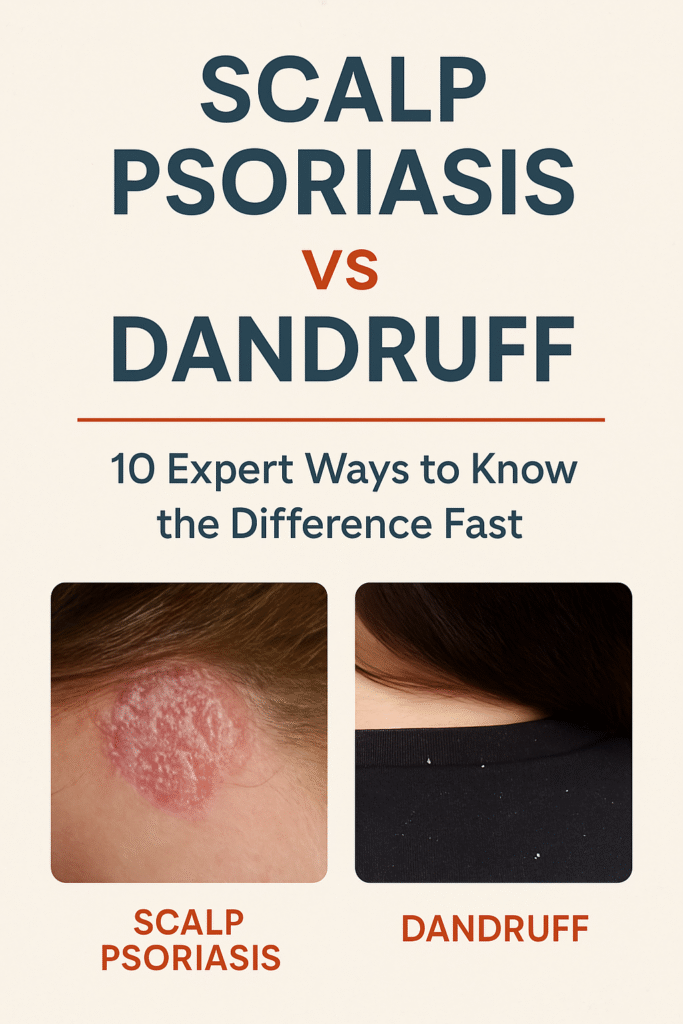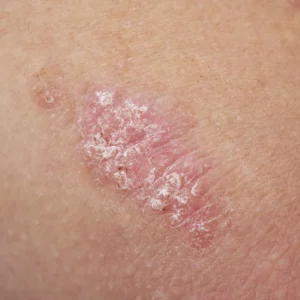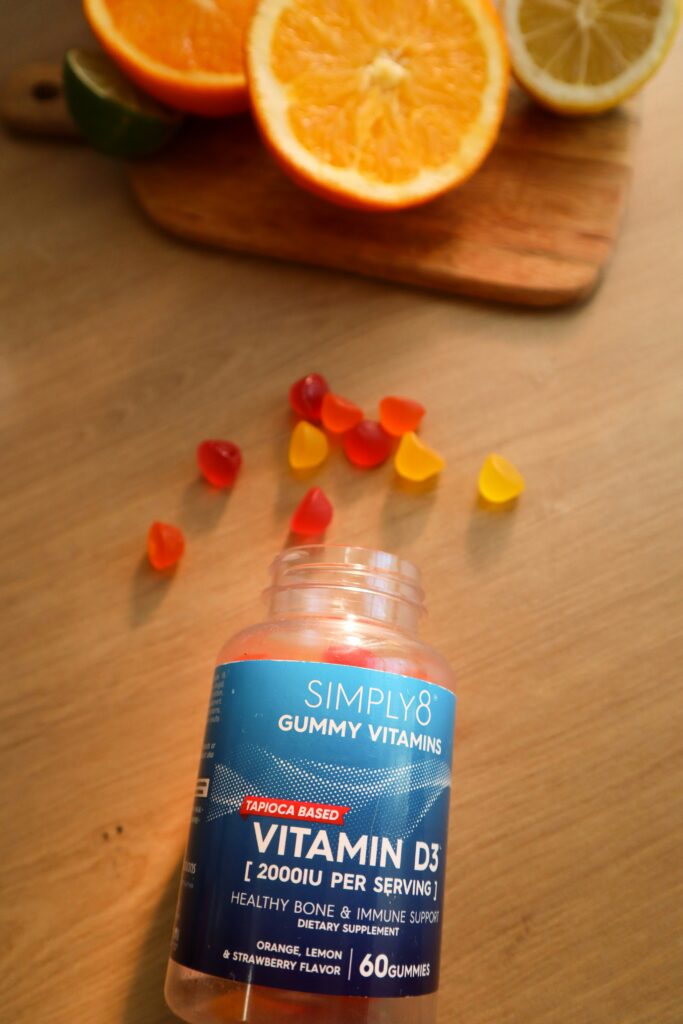
⚠️ Affiliate Disclaimer: This post may contain affiliate links, which means I may earn a small commission — at no extra cost to you — if you make a purchase through one of these links. I only recommend products or services I genuinely trust and believe can provide value. Thank you for supporting My Medical Muse!
Scalp Psoriasis vs Dandruff: 10 Expert Ways to Know the Difference Fast
Table of Contents:
- Introduction: The Itchy Confusion
- What Are These Conditions?
- What Causes Them?
- Who’s at Risk?
- Psoriasis vs Dandruff: At-a-Glance Comparison
- Key Differences You Should Know
- Symptoms You Should Never Ignore
- Myths and Misconceptions
- FAQs: Your Top Questions Answered
- Natural Remedies and Lifestyle Support
- Medical Treatments That Work
- Long-Term Management Strategies
- When to See a Dermatologist
- Final Thoughts: You Deserve a Calm, Flake-Free Scalp
Introduction: The Itchy Confusion
Have you ever stood in front of a mirror, scratching your scalp, wondering why it looks like it just snowed on your shoulders? You’re not alone, for many, the flaky fallout from their scalp can be as embarrassing as it is itchy. But here’s the tricky part: is it just stubborn dandruff or something more serious like scalp psoriasis?
Both conditions can look deceptively similar, but they require completely different treatments. Misidentifying them can lead to wasted time, ineffective products, and even worsening symptoms. This guide is here to end that confusion for good.
We’ll walk you through the expert-level signs that tell scalp psoriasis and dandruff apart so you can finally get the relief you’ve been itching for (literally).
What Are These Conditions?
a. Scalp Psoriasis
Scalp psoriasis is a chronic autoimmune condition where skin cells multiply too quickly, leading to thick, raised, and inflamed patches that often appear silvery or white. It can be painful, itchy, and even emotionally distressing.
Common Symptoms:
- Thick, crusted plaques with silvery-white scale
- Intense itching and burning sensation
- Redness beyond the hairline
- Hair loss from excessive scratching
- Pain or tenderness
It affects about 2-3% of the global population and may coexist with psoriasis on other body parts like elbows, knees, and lower back.
b. Dandruff
Dandruff is a common scalp condition caused by an overgrowth of a yeast-like fungus called Malassezia, which disrupts the natural shedding of skin cells.
Common Symptoms:
- Small, loose flakes (white or yellowish)
- Mild to moderate itching
- Greasy or oily scalp
- No inflammation beyond the scalp
- Improves with anti-dandruff shampoos
Dandruff is far more common than psoriasis and usually easier to manage with consistent scalp care.
What Causes Them?
Scalp Psoriasis Causes:
Causes:
- Genetic predisposition
- Immune system dysfunction
- Triggers like stress, infections, or skin trauma
- Certain medications (e.g., beta-blockers, lithium)
- Environmental triggers like cold weather or dry air
Dandruff Causes:
- Overgrowth of Malassezia fungus
- Oily scalp and poor hygiene
- Cold or dry weather
- Sensitivity to hair products (contact dermatitis)
- Diet low in zinc, vitamin B, or healthy fats
Who’s at Risk?
Psoriasis Risk Factors:
- Family history of psoriasis
- Autoimmune conditions
- Smoking and alcohol use
- Obesity
- Chronic stress
- Hormonal changes (e.g., puberty, menopause)
Dandruff Risk Factors:
- Teenagers and adults under 50
- Male hormones (men are more affected)
- Oily hair and scalp
- Poor diet
- Infrequent hair washing
- Sensitivity to hair care ingredients like sulfates or alcohols
Psoriasis vs Dandruff: At-a-Glance Comparison
| Feature | Scalp Psoriasis | Dandruff |
| Cause | Autoimmune disorder | Fungal overgrowth, dry/oily skin |
| Flake type | Thick, silvery-white, scaly | Loose, thin, white/yellow flakes |
| Itchiness | Intense, may burn | Mild to moderate itch |
| Inflammation | Red, inflamed patches often beyond hairline | Mild or no redness |
| Coverage | Can affect entire scalp | Mostly localized, patchy |
| Other body areas | May appear on elbows, knees, etc. | Rarely appears elsewhere |
| Hair loss | Possible due to scratching or inflammation | Very rare |
| Contagious? | No | No |
| Chronic condition? | Yes, lifelong management needed | Usually manageable with shampoo |
| Treatment | Medicated topicals, light therapy, biologics | Anti-fungal shampoos, scalp hygiene |
Key Differences You Should Know
- Flake Texture: Psoriasis flakes are thick and stuck-on; dandruff flakes are loose and powdery.
- Color of Scales: Psoriasis scales are silvery-white; dandruff flakes are white to yellowish.
- Severity of Itch: Psoriasis itch can be intense and painful; dandruff itch is more of a nuisance.
- Redness and Swelling: Psoriasis causes raised red plaques; dandruff may cause mild redness.
- Bleeding After Scratching: Psoriasis patches may bleed; dandruff rarely does.
- Affected Areas: Psoriasis often spreads beyond the scalp; dandruff stays localized.
- Hair Loss: More likely with psoriasis due to inflammation and scratching.
- Associated Symptoms: Psoriasis may include joint pain or fatigue.
- Response to Shampoo: Dandruff improves quickly with anti-dandruff shampoo; psoriasis doesn’t.
- Duration: Psoriasis is chronic and lifelong; dandruff fluctuates and may resolve.
Symptoms You Should Never Ignore
- Red, scaly patches that extend beyond the scalp
- Pain, burning, or stinging sensations
- Excessive shedding of thick flakes
- Bleeding or oozing skin
- Noticeable hair thinning or bald patches
- Flare-ups that don’t improve with dandruff shampoo
- Joint pain or stiffness alongside scalp symptoms
Myths and Misconceptions
Dandruff means you’re dirty
Truth: It’s often caused by fungus or skin sensitivity not poor hygiene.
Psoriasis is contagious
Truth: It’s an autoimmune condition and cannot be spread through contact.
Only adults get scalp psoriasis.
Truth: Children and teens can develop it too.
Scrubbing removes flakes faster.
Truth: Scrubbing can worsen inflammation and cause bleeding.
If dandruff shampoo doesn’t work, it must be psoriasis.
Truth: Other conditions like seborrheic dermatitis or eczema can mimic both.
FAQs: Your Top Questions Answered
Can I dye my hair if I have scalp psoriasis?
- Yes, but use ammonia-free dyes and avoid coloring during flare-ups.
Is dandruff seasonal?
- Yes. It often worsens in winter due to dry air and reduced sunlight.
What’s the difference between seborrheic dermatitis and dandruff?
- Seborrheic dermatitis is a more severe form of dandruff with inflammation.
Can stress trigger scalp psoriasis?
- Absolutely. Stress is a known trigger for autoimmune flare-ups.
How long does it take for treatments to work?
- Dandruff may improve in days; psoriasis treatments can take weeks to months.
Natural Remedies and Lifestyle Support
Hair Care Tips:
- Use gentle, sulfate-free shampoos with tea tree oil or salicylic acid.
- Avoid scratching; use cold compresses to relieve itching.
- Apply coconut oil, aloe vera, or jojoba oil to soothe irritation.
- Rinse with diluted apple cider vinegar.
- Limit harsh dyes, bleach, and heat styling tools.
Diet and Lifestyle:
- Eat an anti-inflammatory diet: omega-3s, leafy greens, berries
- Stay hydrated
- Reduce stress through yoga, journaling, or meditation
- Exercise regularly
- Avoid sugar, dairy, and processed foods
Medical Treatments That Work
For Scalp Psoriasis:
- Topical corticosteroids
- Vitamin D analogs (e.g., calcipotriol)
- Coal tar shampoos
- Phototherapy (UVB light)
- Biologic drugs for severe cases
For Dandruff:
- Zinc pyrithione shampoo
- Ketoconazole shampoo
- Salicylic acid shampoos
- Coal tar shampoos
- Selenium sulfide shampoo
Long-Term Management Strategies
Daily Habits:
- Use a gentle shampoo
- Avoid scratching
- Moisturize the scalp with oils or medicated treatments
Weekly Care:
- Exfoliate gently (if recommended).
- Apply deep-conditioning treatments.
- Track flare-ups and triggers using a journal.
Lifestyle Adjustments:
- Manage stress proactively.
- Eat anti-inflammatory foods.
- Stay hydrated.
- Exercise regularly.
- Prioritize sleep and self-care.
Medical Follow-Up:
- Schedule regular dermatologist visits
- Adjust treatments seasonally.
- Consider advanced therapies if needed
When to See a Dermatologist
- If symptoms persist despite using dandruff shampoos.
- If you notice bleeding, crusting, or thick scales.
- If psoriasis affects your sleep or confidence.
- If hair loss becomes noticeable or rapid.
- If you’re unsure about your diagnosis
- If over-the-counter products aren’t working.
Final Thoughts: You Deserve a Calm, Flake-Free Scalp
Scalp discomfort can be frustrating, but understanding the difference between dandruff and scalp psoriasis is the first step toward effective treatment. Whether you’re managing a chronic autoimmune condition or fighting off annoying flakes, there are solutions available both natural and medical.
Don’t ignore your symptoms or rely on guesswork. Get the right diagnosis, build a scalp care routine that works for you, and don’t be afraid to seek professional help. A healthy scalp isn’t just possible, it’s within reach.
You deserve relief, you deserve clarity and most of all, you deserve to feel confident in your skin.
👩⚕️ Need Personalized Health Advice?
Get expert guidance tailored to your unique health concerns through MuseCare Consult. Our licensed doctors are here to help you understand your symptoms, medications, and lab results—confidentially and affordably.
👉 Book a MuseCare Consult NowRelated Post You Might Like:
- 13 Powerful Ways Zinc Deficiency Wrecks Your Skin and Immunity (Backed by Science)
- 7 Shocking Causes of Vitamin Deficiency Tingling and Crawling Skin
- 12 Shocking Folate Deficiency Symptoms in 30s and 40s You Shouldn’t Ignore
- 12 Powerful Health Benefits of Coffee Backed by Science
- 10 Sneaky Symptoms of Prediabetes in Women Over 40 You Can’t Ignore

 Causes:
Causes:
